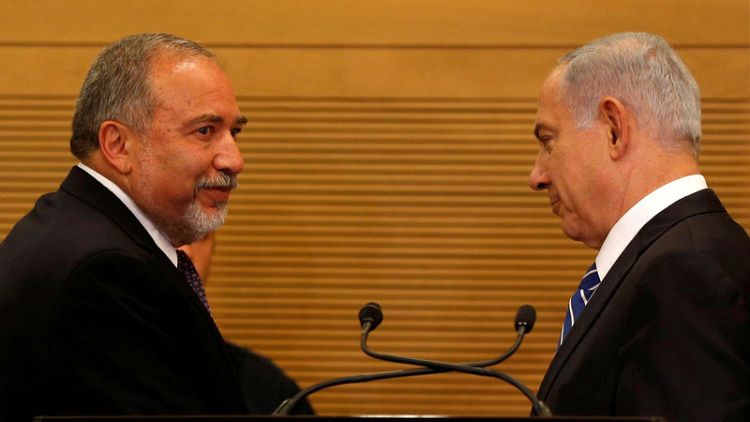By Jeffrey Heller
JERUSALEM (Reuters) - Israel moved closer towards a new election on Wednesday after kingmaker Avigdor Lieberman declined to back either Prime Minister Benjamin Netanyahu or challenger Benny Gantz with a deadline on building a government about to expire.
Neither Netanyahu, who heads the right-wing Likud party, nor ex-general Gantz of the centrist Blue and White secured a ruling majority in parliament in elections in April and September.
Netanyahu, in office for the past decade, failed to put together a coalition after the inconclusive September election. Gantz was handed the task by President Reuven Rivlin next but his 28 days to form a government expire at midnight (2200 GMT).
There was no sign of progress towards a Rivlin-proposed deal for a national unity government that would include Likud and Blue and White after weeks of talks.
Lieberman, who heads the far-right Yisrael Beitenu party told a news conference on Wednesday that "both (Netanyahu and Gantz) were guilty" in failing to agree on a Likud-Blue and White alliance, which he had strongly advocated.
With no unity government in sight, Lieberman said, he would deny both men the support of his party's eight legislators, effectively meaning that neither Netanyahu nor Gantz would have sufficient backing to form more narrow administrations.
"As things stand now, we are on the way to another election," Lieberman said.
Lieberman, a former defence minister, said he would not join any alternative to a Likud-Blue and White coalition.
ULTRA-ORTHODOX
Lieberman reiterated his opposition to a Likud-led government that included ultra-Orthodox Jewish parties whose religious influence over life in Israel he opposes, or to an administration headed by Blue and White that would be dependent on support from Arab parties he described as a "fifth column".
Such rhetoric, also echoed by Netanyahu, has drawn rebukes from Rivlin, who warned against demonising Israel's 20 percent Arab minority.
Rivlin had proposed a "rotation" agreement between Netanyahu and Gantz in which the Likud leader would take a leave of absence as prime minister should he be indicted on corruption charges. Netanyahu has denied wrongoing in the three cases.
Gantz has balked at ultra-Orthodox participation in a unity government, saying he wanted to establish a "liberal" administration more in tune with Israel's secular Jewish majority.
Netanyahu had insisted on preserving what he has described as a right-wing bloc - whose support he would need should he seek parliamentary immunity from prosecution if he is indicted.
Israel's attorney-general is widely expected to announce within days whether he will accept police recommendations to charge Netanyahu.
Netanyahu faces no legal requirement to leave government if indicted. He could face fraud and breach of trust charges in all three probes, and bribery charges in one.
Should Wednesday's deadline expire without a coalition deal, a 21-day period will begin in which legislators can nominate any lawmaker, subject to the agreement of at least 61 of parliament's 120 members and a formal mandate from Rivlin, to try to establish a coalition.
Failure to do so automatically triggers an election in 90 days.
